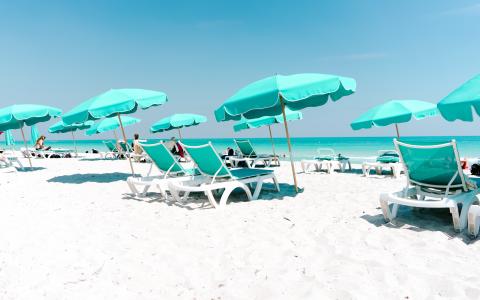
More than ever, we need a vacation. For retirees and near-retirees who are older than 60 and more vulnerable to the coronavirus, however, taking one this summer stands to be tricky.
The good news is leisure travel will be possible; the bad is that it won’t look the same as before the pandemic.
International travel is all but out as many countries institute 14-day quarantine requirements for visitors. Some states, including Maine and Hawaii, also have self-quarantine mandates of varying lengths. Trips popular with retirees such as group tours generally aren’t happening. And cruise operators remain under a no-sail order that’s currently set to expire in late-July.
The question, then, becomes how to travel safely to avoid catching the coronavirus. Think about activities that lend themselves to social distancing—such as car trips, golfing, camping, or hiking—travel experts say. They add that this isn’t the year for spur-of-the-moment trips; because of demand and social-distancing capacity limits, it’s important to book lodging or camp space and double check reservations before leaving.
So yes, there are more restrictions and factors to consider when vacationing this year, but that doesn’t mean travel is out. Here are some things to know.
Parks and Rec
Visiting and camping in the national parks is always popular but the pandemic is crimping lodging capacity, says Betsy O’Rourke, chief marketing officer for Xanterra Travel Collection, which runs many of the campsites, resorts, and concessions for the western national parks, including Yellowstone, Grand Canyon, and Glacier.
Only campers with reservations are allowed, and they must go to assigned locations. The number of campsites and parking spaces for RVs and campers are the same as before the pandemic, O’Rourke says, but there are fewer rooms available at Xanterra resorts because of social-distancing precautions. O’Rourke also says that national park lodging options are limited and could be sold out, so check ahead.
She notes that there are plenty of easy and moderate hikes in the national parks, plus she recommends drives through the parks, especially for people with four-wheel-drive vehicles.
Pro tip: Tazim Jamal, professor in the department of recreation, park and tourism sciences at Texas A&M University, offers another tip to vacation safely: Visit lesser-known ecological or cultural area-based attractions to avoid crowds. Also, limit potential exposure to Covid-19 by staying in one place and exploring it thoroughly, rather than visiting several locations in one trip.
Stay Safe
A May survey by MMGY Global, a travel sentiment and research firm, showed that retirees and near-retirees (ages 50-64) are the most eager to travel—and are least concerned about contracting Covid-19.
“They are a little more experienced, a little more mature, perhaps a little bit more circumspect about these things.” says Clayton Reid, CEO of MMGY Global. “And we also know that for older travelers, travel is a big part of what they do with their discretionary income.”
But responsible travelers should think about their own health as well as the risk they may pose to others, says Christine Budke, professor of epidemiology at Texas A&M University who has been working with Jamal on advice for safe travels during the pandemic.
Vacationers should take care to avoid the emergency room if possible as many hospitals have limited resources after grappling with coronavirus cases this spring and would be stretched further if there is another outbreak. She recommends travelers to know their limits and avoid high-risk activities that could lead to injury. “This isn’t the time to take up extreme sports,” Budke says.
Pro tip: Pauline Frommer, editorial director of Frommers travel guidebooks, says vacationers shouldn’t be lax about handwashing and bring sanitizer everywhere (there’s no excuse for not doing so, as airline passengers will be allowed to carry on up to 12 ounces of hand sanitizer, up from 3.4 ounces). Travelers should also bring face coverings and expect to wear them when asked or in any situations where maintaining social distance would be difficult.
Changes at Hotels
Hotels are stepping up their cleaning protocols. Christine Loose, vice president of lodging and wellness for Kohler, says its resort about an hour north of Milwaukee is managing capacity to allow for deeper cleaning and social distancing and has opened properties in a phased approach.
After a guest leaves, the hotel operator is disinfecting rooms and letting them sit empty for one to three days, with a housekeeper putting a seal on the door when finished cleaning. There is also increased cleaning of public areas.
The hotel operator is also taking guests’ temperatures, something they’re told when reservations are booked. “Guests have been very positive about that. I was a little nervous about it,” Loose says.
Xanterra’s O’Rourke says the company has increased the amount of cleaning in the public bathrooms at the parks and added more signs about handwashing, and installed more camp sanitation stations in more locations. She also says the company is looking for ways to make all transactions or interactions virtually touchless, including by encouraging credit-card use instead of cash.
Frommer says hotels are probably safe to stay in, but she says not to expect the usual amenities such as bottles of shampoo and other toiletries as well as limited food options.
Pro tip: “The best piece of advice I can give is research, research, research and double check before you hit the road,” Frommer says. “You may find that you think something is open and it turns out they had to close. And you really cannot count on being able to drive to a town and find a hotel that will take you.”
This article originally appeared on MarketWatch.



